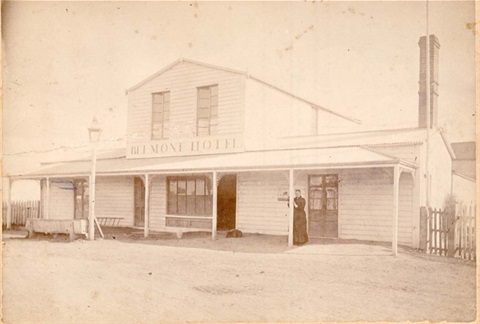Belmont Hotel

The first known references to the Belmont Hotel were in February 1857 when the Argus ran an articles calling for tenders for forming and metalling a road near Barry’s farm in Preston. Completed tenders were to be left with the Chairman of the Epping District Road Board at the Belmont Hotel. The hotel was fairly small and would have catered to local farmers and passing trade.
The Epping District Road Board used the Belmont Hotel as its regular meeting place. The road board was the earliest form of local government in Darebin and covered an area from Northcote to Whittlesea. Such was the distances covered and the state of the roads that the Northcote representatives would spend the night at the hotel and travel home the next day.
In April 1860 the publican at the Belmont was James Downie, but by the next year he had been replaced by John Devine. It was to remain the headquarters of the Epping District Road Board until 1867. At that time the publican went broke and the representatives of the Board arrived one day to find all their furniture repossessed. The meeting went ahead with the representatives perched on old boxes.
Even after the Belmont fell out of favour with the Epping District Road Board, it continued to serve as an important meeting place for local farmers. In 1882 the local farmers met at the hotel for form a petition to the Parliament asking for only unadulterated milk to be supplied to the people of Melbourne.
By the 1880s the license had passed on to the Larmers. After the death of Michael Larmer the license passed to his wife Frances. When she died suddenly in June 1882 an inquest was requested. Frances was found to have been drinking heavily for the preceding year and had been bed ridden for the two days prior to her death. She was 38.
Very soon afterwards the lease of the hotel and a farm of 144 acres was offered for a four year term. George Hill took up the license but was only there until April 1883 when Alexander Selkirk took over.
Like many hotels, the Belmont used a variety of methods to draw in the crowds. Foremost amongst these activities were included horse racing and athletics. The Belmont Races were a common feature in the sporting calendar and over Easter in 1889 the hotel played host to a athletics carnival. Buses carried spectators from Clifton Hill and the events included a Maiden’s race and Boy’s race, hurdles, high jumps and the intriguingly named Greasy Pig Race.
At between 7 and 8pm on Tuesday 8th August 1890 a fire broke out at the Belmont Hotel. The hotel’s owner, Peter McCoy, as well as the licensee, Selkirk escaped, however the main building was lost. The Preston Volunteer Fire Brigade had arrived at the fire but the only water was at a nearby dam and the firemen were forced to use buckets to try dowse the flames. The fire was blamed on a boy carelessly dropping a lit match into a bucket of gasoline. At the time of the fire the hotel was described as “a very old two-storey iron building, with wooden lining”.
McCoy rebuilt the hotel as was to remain there for many years. He died in 1916, leaving assets of £1,800 and real estate with a value of over £500.
In January 1934 John Richardson of the Belmont Hotel was fined for operating the hotel without a current license. At the same time the owner of the hotel, David Scott, was declared bankrupt as a result of the downturn following the Great Depression.
Six months later the new licensee Mrs Ethel Gould was assaulted at the hotel, Walter Buttress, a shoemaker from Reservoir earning himself a three month jail sentence.
The following year, Ethel Gould, the nominee licensee of the hotel had the liquor license transferred from Mary Taylor to herself. Three years later she transferred the license to Jack Rose, formerly of the Federal Hotel, Collins Street Melbourne.
The licence continued to change hands, in November 1942 the then licensee Olive May Brown transferred the license to Henry William Welch. Welch held the license until it expired in February 1945. He then auctioned the contents of the hotel which included
“…period sideboard, oval dining table, Wilton carpet 15ft x 12ft,
2 oak double bedroom suites, single bed and mattress…
2 meat safes, National cash register, large wall clock, large
large quantity of linen sheets…”
At the same time the license was transferred to Catherine Devine Goodwin, of 34 Park Place, South Yarra.
The hotel was to continue operating right through to the early 1990s when, having survived both fire and Great Depression, it was demolished to make way for the Northern Ring Road.
Known publicans
1860 James Downie
1861 John Devine
1876 Michael Larmer
1882 Frances Larmer
1882 George Hill
1883 Alexander Selkirk
1890 Peter McCoy
1930 Mrs J. Clayton
1934 John Richardson
1934 Ethel Gould
1935 Mary Taylor
1938 Jack Rose
1942 Olive May Brown
1942 Henry William Welch
1945 Catherine Devine Goodwin
1953 J. E. Hills
1974 J. Donnelly
Cole, Robert K. Index of Hotels 1841 – 1949. Unpublished manuscript.
Darebin Libraries. Local History File: Hotels.
Edge, Gary (2004). Surviving the six o’clock swill: a history of Darebin’s hotels. Melbourne: Darebin Libraries.
Various articles 1857-1945 The Argus (Melbourne, Vic : 1848-1956)